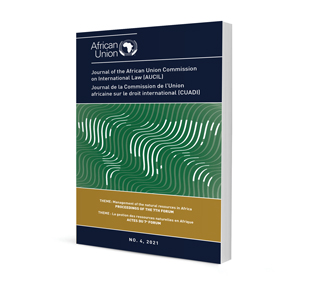
The legal frameworks of the Nile Basin: Opportunities and challenges / Cadres juridiques du bassin du Nil : opportunités et obstacles
Author: Dereje Zeleke Mekonnen
ISSN: 1821-8962
Affiliations: PhD; Associate Professor of International Law, Addis Ababa University, School of Law, University of Malawi, Chancellor College
Source: Journal of the African Union Commission on International Law 2021, p. 185-203
https://doi.org/10.47348/AUCIL/2021/a6
Abstract
The use of shared natural resources is a difficult task and the use of trans-boundary freshwater resources poses an even greater challenge, with a higher propensity for conflict. The belated development of international law in the area has contributed considerably to the difficulties. The essence of the international legal regime governing the use of shared water resources is anchored in the twin principles of equitable and reasonable use and no significant harm. Concluding a lasting deal governing the use and protection of shared freshwater resources by taking all relevant factors into account within an inclusive legal and institutional framework is the standard approach. The Nile Basin exhibits peculiar features that make equitable and sustainable use of the water resources a daunting task, depriving the Basin states of the opportunity for cooperative development and shared use. Ensuring the equitable and sustainable use of the Nile waters has been an elusive objective pursued by the riparian countries for over half a century. The existing legal frameworks, especially the colonial and early postcolonial ones, still constitute a formidable challenge to the new cooperative legal framework that began to take shape in the late 1990s, thus keeping the Basin in a legal and hydro-political stasis that has stalled progress and might even undo hard-won achievements.
L’utilisation des ressources communes est une tâche difficile et l’utilisation transfrontalière des ressources en eau douce pose encore un plus grand challenge avec une grande propension au conflit. Le développement tardif du droit international dans la région a considérablement contribué aux problèmes. L’essence du régime juridique international régissant l’utilisation commune des ressources en eaux est soutenue par le double principe de l’utilisation équitable et raisonnable et pas de préjudice significatif. L’approche standard est de conclure un accord durable régissant l’utilisation et la protection des ressources communes en eau douce tenant en compte tous les facteurs importants dans un cadre juridique et institutionnel inclusif. Le Bassin du Nil présente des caractéristiques particulières qui rend l’utilisation équitable et raisonnable des ressources en eau une tâche ardue privant ainsi les États du Bassin de la possibilité d’un développement coopératif et d’une utilisation partagée. Assurer l’utilisation équitable et durable des eaux du Nil est un objectif illusoire poursuivi par les pays riverains depuis plus d’un demi-siècle. Les régimes juridiques existants, ceux spécialement coloniaux et post coloniaux, constituent toujours un énorme obstacle pour le nouveau régime juridique coopératif qui a commencé à prendre forme vers la fin des années 1990, maintenant ainsi le Bassin dans une stagnation juridique et hydro-politique qui a freiné les progrès et pourrait même éventuellement défaire les accomplissements durement acquis.